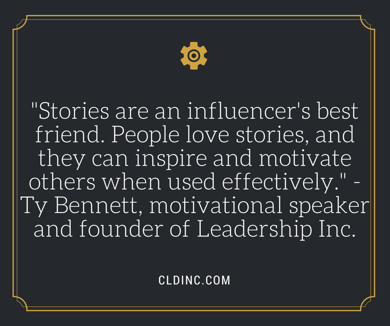Training in general can be challenging, but training sales professionals can be even more so. Good sales representatives tend to be good at building relationships, and many relationships are built upon shared stories. One important way to connect with sales professionals you’re training is by appealing to the storyteller in them.
Whatever product you’re selling (including the “product” of training), storytelling is powerful and adds value. Telling a story makes you relatable, touches the emotions, and is fleshed-out and multi-dimensional. With these elements in place, you can really reach your trainees and you can be confident that the lessons learned will stay with them. People are remarkably adaptive. After all, it’s built into our DNA. Motivation to adapt and change requires a sense of urgency, and appealing to trainees’ emotions through storytelling can create that sense of urgency to learn.
Storytelling Appeals to Emotion; Emotion Helps Learning Stick
Pharmaceutical sales training has to utilize the pre-frontal cortex because there is so much technical and scientific information that’s essential for pharma reps to do their work well. However, it’s a small part of the brain called the amygdala, which regulates emotions, which can create a bigger impact than the logic going on in the prefrontal cortex. When new behaviors take a route through the amygdala (the emotional center), they’re more likely to be remembered and put into use.
Logic makes people think, while emotions make people change. Therefore, engaging the emotions of the people you’re training makes it more likely they’ll put what they’ve learned to use. Think about the last movie you saw that made you feel differently after the credits rolled. Chances are there was something about it that struck a chord emotionally. Appeal to your trainees’ emotions, and you can be confident the lessons will stick.
Start Pharmaceutical Sales Training with the “Why” to Keep Them Engaged
Of course you want your pharma reps’ performance to be outstanding, and so do they since it’s their livelihood. When you start your training programs by addressing the “why” you have a natural starting off place for your training narrative, something that is important to both you and your learners.
If a there is an underlying foundation of “why” beneath a training program, then all those anecdotes, interesting pieces of data, bullet points, and video clips are more likely to be retained. On a conscious or subconscious level, when learners understand that, “I’m learning this for a reason, and I will be better for it,” they’re more likely to make the positive changes necessary to improve performance or learn about a new product line.
“Characters” Must Be Relatable, With Trainees as “Heroes”
Whatever your industry, the narrative that weaves through your training programs has to make sense to the work culture. The characters in stories or role playing exercises should be clearly recognizable to the trainees. Moreover, the skills and behaviors your learners incorporate should set them up to be the hero of their own sales success story.
Without a narrative holding things together, training materials are little more than a data dump. A compelling story adds history, context, and relevance that works to help concepts stand out and make sense in terms of your sales professionals’ day-to-day responsibilities.
Sales Professionals Use Storytelling in Their Work Too
If you have ever shadowed or done a ride-along with one of your top sales professionals, you may have noticed that he or she is great at blending storytelling into the job. Somehow they tied together an anecdote about traffic or grabbing coffee in the lobby with the new study data they are showing to a client. People love stories and successful sales professionals use them all the time. When you as a trainer employ storytelling in training programs, it shows that you “get” sales professionals and lets you make use of one of the most effective learning tools humans have.
Pharma sales training is both personal and technical because the successful rep has to be able to establish warm relationships with potential clients as well as provide them with the technical data they require for making decisions. In order to provide the training needed, trainers have to use a range of techniques, effective materials, and programs that take advantage of the latest technologies. Take a look at our free online resources, and if you have any questions at all, don’t hesitate to contact us at any time.






